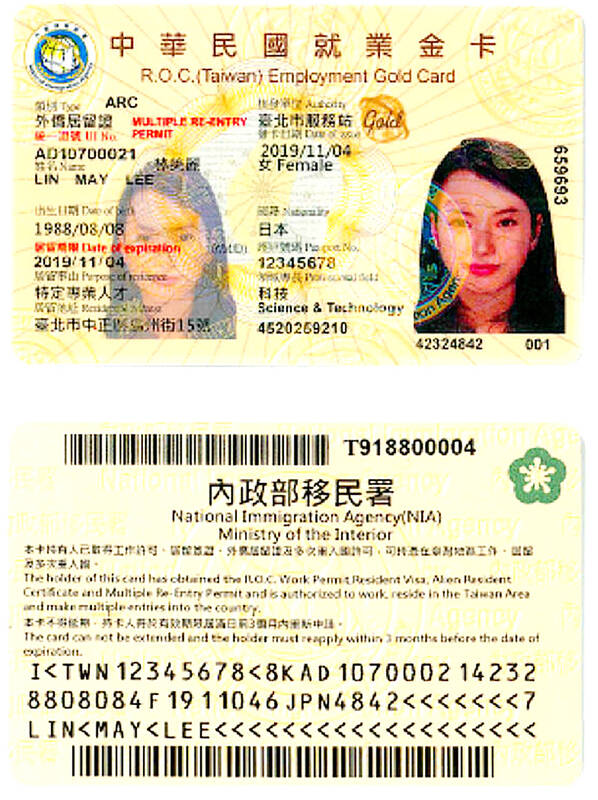More than 200 people with high-level expertise in the digital industry last year secured the Employment Gold Card, with about 60 percent working in software development jobs, data from National Development Council and Administration for Digital Industries showed.
Launched in 2018, the card combines the functions of a resident visa, work permit, Alien Resident Certificate and re-entry permit, and allows foreign professionals to leave and re-enter Taiwan multiple times over the course of one to three years.
Foreigners are eligible to apply for gold cards if they have expertise in science, technology, economy, education, culture, arts, sports, finance, law, architecture, national defense or digital industries.

Photo courtesy of the National Development Council
The qualifications of foreign professionals would be assessed by government officials regulating these industries, and applicants are not required to receive job offers to apply for gold cards.
Those who do not have expertise in the listed categories might still be qualified for gold cards as special cases, depending on the National Development Council consultation with government officials. Foreign professionals with specialized knowledge and skills in digital industries were not qualified for employment gold cards until the middle of last year.
Applicants must meet one of the following requirements: having at least eight years of relevant professional experience in digital economy-related industries, having held positions in a digital economy-related industry in Taiwan or other countries with a most recent monthly salary of at least NT$160,000, or having graduated with a doctorate from one of the top 500 universities listed in the most recent QS World University Rankings, Times Higher Education World University Rankings or US News and World Report Rankings.
Meanwhile, those with expertise in the products or services required in the digital economy-related industries can also apply if they have obtained a doctoral degree in related fields at a domestic or foreign university, and if they received domestic or foreign awards recognized by the Ministry of Digital Affairs, or had more than four years of work experience in related fields.
As of December last year, 216 foreigners secured employment gold cards because of high-level expertise in the digital industry, which accounted for 2.4 percent of the gold cards issued since 2018.
The Administration for Digital Ministries of the Ministry of Digital Affairs is in charge of reviewing gold card applicants working in the digital industry. As of January, the administration had received 420 applications, 298 of which met the requirement for a gold card, administration data showed.
The expertise of the applicants varies from software development, computer programming, e-commerce and video gaming to cybersecurity, the administration said, adding that about 60 percent of applicants are working in software development-related fields.
Applicants who secured gold cards are mainly developers of software, digital content and video games, the administration added.
Seventy percent of the applicants from the digital industries are 39 years of age or younger, the administration said.
Aside from Employment Gold Cards, the administration is offering subsidies on flight tickets as incentives to attract talent in the digital economy field, it said, adding that the application deadline for subsidies is the end of October.

Chinese Nationalist Party (KMT) Chairman Eric Chu (朱立倫), spokeswoman Yang Chih-yu (楊智伃) and Legislator Hsieh Lung-chieh (謝龍介) would be summoned by police for questioning for leading an illegal assembly on Thursday evening last week, Minister of the Interior Liu Shyh-fang (劉世芳) said today. The three KMT officials led an assembly outside the Taipei City Prosecutors’ Office, a restricted area where public assembly is not allowed, protesting the questioning of several KMT staff and searches of KMT headquarters and offices in a recall petition forgery case. Chu, Yang and Hsieh are all suspected of contravening the Assembly and Parade Act (集會遊行法) by holding

PRAISE: Japanese visitor Takashi Kubota said the Taiwanese temple architecture images showcased in the AI Art Gallery were the most impressive displays he saw Taiwan does not have an official pavilion at the World Expo in Osaka, Japan, because of its diplomatic predicament, but the government-backed Tech World pavilion is drawing interest with its unique recreations of works by Taiwanese artists. The pavilion features an artificial intelligence (AI)-based art gallery showcasing works of famous Taiwanese artists from the Japanese colonial period using innovative technologies. Among its main simulated displays are Eastern gouache paintings by Chen Chin (陳進), Lin Yu-shan (林玉山) and Kuo Hsueh-hu (郭雪湖), who were the three young Taiwanese painters selected for the East Asian Painting exhibition in 1927. Gouache is a water-based

Taiwan would welcome the return of Honduras as a diplomatic ally if its next president decides to make such a move, Minister of Foreign Affairs Lin Chia-lung (林佳龍) said yesterday. “Of course, we would welcome Honduras if they want to restore diplomatic ties with Taiwan after their elections,” Lin said at a meeting of the legislature’s Foreign Affairs and National Defense Committee, when asked to comment on statements made by two of the three Honduran presidential candidates during the presidential campaign in the Central American country. Taiwan is paying close attention to the region as a whole in the wake of a

OFF-TARGET: More than 30,000 participants were expected to take part in the Games next month, but only 6,550 foreign and 19,400 Taiwanese athletes have registered Taipei city councilors yesterday blasted the organizers of next month’s World Masters Games over sudden timetable and venue changes, which they said have caused thousands of participants to back out of the international sporting event, among other organizational issues. They also cited visa delays and political interference by China as reasons many foreign athletes are requesting refunds for the event, to be held from May 17 to 30. Jointly organized by the Taipei and New Taipei City governments, the games have been rocked by numerous controversies since preparations began in 2020. Taipei City Councilor Lin Yen-feng (林延鳳) said yesterday that new measures by